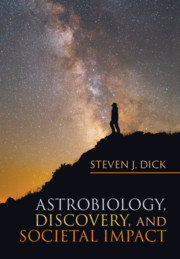Crossref Citations
This Book has been
cited by the following publications. This list is generated based on data provided by Crossref.
Lingam, Manasvi
and
Loeb, Abraham
2019.
Relative Likelihood of Success in the Search for Primitive versus Intelligent Extraterrestrial Life.
Astrobiology,
Vol. 19,
Issue. 1,
p.
28.
Pass, Jim
2020.
Mars Exploration - a Step Forward.
Dick, Steven J.
2020.
Space, Time, and Aliens.
p.
213.
Lupisella, Mark
2020.
Cosmological Theories of Value.
p.
115.
Dick, Steven J.
2020.
Space, Time, and Aliens.
p.
207.
Lingam, Manasvi
and
Loeb, Abraham
2020.
What's in a name: the etymology of astrobiology.
International Journal of Astrobiology,
Vol. 19,
Issue. 5,
p.
379.
Dick, Steven J.
2020.
Space, Time, and Aliens.
p.
229.
Dick, Steven J.
2020.
Space, Time, and Aliens.
p.
631.
Dick, Steven J.
2020.
Space, Time, and Aliens.
p.
129.
Lupisella, Mark
2020.
Cosmological Theories of Value.
p.
97.
Dick, Steven J.
2020.
Space, Time, and Aliens.
p.
755.
Kellermann, Kenneth I.
Bouton, Ellen N.
and
Brandt, Sierra S.
2020.
Open Skies.
p.
229.
Valk, John
2021.
Worldviews.
p.
175.
Peters, Ted
2021.
Astrobiology.
p.
17.
Impey, Chris
2021.
Astrobiology.
p.
135.
Crawford, Ian A.
2021.
Astrobiology.
p.
313.
Lupisella, Mark
2021.
Expanding Worldviews: Astrobiology, Big History and Cosmic Perspectives.
Vol. 58,
Issue. ,
p.
217.
Crawford, Ian A.
2021.
Expanding Worldviews: Astrobiology, Big History and Cosmic Perspectives.
Vol. 58,
Issue. ,
p.
341.
Profitiliotis, George
2022.
Anticipatory Science Diplomacy as a Governance And Cooperation Mechanism for the Search for Extraterrestrial Life.
Journal of Science Policy & Governance,
Vol. 20,
Issue. 03,
Reinecke, David
and
Bimm, Jordan
2022.
The maintenance of ambiguity in Martian exobiology.
Social Studies of Science,
Vol. 52,
Issue. 2,
p.
199.





